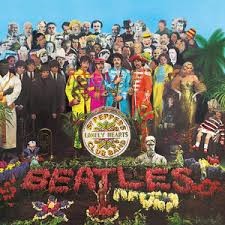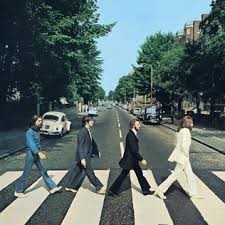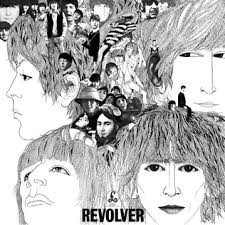- Sgt. Pepper’s Lonely Hearts Club Band (1967) – Often cited as one of the greatest and most influential albums ever. It was groundbreaking in its production techniques and concept.
- Abbey Road (1969) – The last album recorded by the Beatles (though not the last released), featuring some of their most beloved songs and innovative production.
- Revolver (1966) – A turning point in the Beatles’ career, showcasing their evolution in songwriting and studio experimentation.
- The Beatles (White Album) (1968) – A diverse double album demonstrating the band’s wide-ranging talents and individual songwriting strengths.
- Rubber Soul (1965) – Marked a shift towards more mature, introspective songwriting and influenced many contemporary artists.
1. Sgt. Pepper’s Lonely Hearts Club Band (1967)

Released in 1967, Sgt. Pepper’s Lonely Hearts Club Band marked a pivotal moment in The Beatles’ career and rock music history. This groundbreaking album showcased the band’s innovative studio techniques and conceptual approach to songwriting. The Beatles, along with producer George Martin, pushed the boundaries of recording technology, utilizing multi-track tape machines and experimenting with unconventional instruments and sound effects. The album’s psychedelic influences and artistic packaging, featuring the iconic cover designed by Peter Blake, reflected the cultural zeitgeist of the 1960s.
Sgt. Pepper’s blend of rock, pop, and avant-garde elements resonated with critics and audiences alike, topping charts worldwide and earning multiple Grammy Awards. Its impact on popular culture and the music industry was profound, inspiring countless artists and shaping the concept of the album as an art form. Today, Sgt. Pepper’s Lonely Hearts Club Band remains a landmark recording, celebrated for its creativity, technical innovation, and enduring influence on popular music
2. Abbey Road (1969)

Abbey Road, released in 1969, stands as The Beatles’ final recorded album and a crowning achievement in their illustrious career. This iconic album showcases the band’s musical maturity and cohesion, despite the internal tensions that would soon lead to their breakup. Produced by George Martin, Abbey Road features some of The Beatles’ most polished and innovative songwriting. The album’s sound is characterized by its rich, warm tones, achieved through the use of cutting-edge recording techniques and the newly acquired solid-state mixing desk at EMI Studios.
From the hard rock of “Come Together” to the sweeping orchestration of “Something,” and the groundbreaking medley that concludes Side Two, Abbey Road demonstrates the band’s versatility and artistic vision. The album’s cover, featuring the four Beatles crossing the titular London street, has become one of the most recognizable and imitated images in popular culture. Abbey Road topped charts worldwide and continues to be celebrated as a masterpiece of 60s rock music.
3. Revolver (1966)

Revolver, released in 1966, marks a pivotal moment in The Beatles’ career and the evolution of rock music. This groundbreaking album showcases the band’s experimental approach to songwriting and studio techniques. Produced by George Martin, Revolver features innovative use of tape loops, backwards recordings, and early examples of sampling. The album’s sound palette expanded to include Indian instruments, reflecting George Harrison’s growing interest in Eastern philosophy and music. Lyrically, the songs explore themes ranging from tax evasion to psychedelic experiences, signaling a shift towards more complex and mature subject matter.
Revolver’s diverse musical styles, from the string octet on “Eleanor Rigby” to the heavy guitar distortion on “Taxman,” demonstrate The Beatles’ versatility and willingness to push boundaries. The album’s influence on psychedelic rock, art rock, and the concept of the studio as an instrument cannot be overstated. Revolver topped charts worldwide and continues to be regarded as one of the greatest albums in rock history.
4. The Beatles (White Album) (1968)

The Beatles, commonly known as the White Album, is a double album released in 1968 that showcases the band’s diverse musical talents and individual songwriting styles. Recorded during a period of tension within the group, the album reflects the band members’ growing independence and varied interests. The White Album spans a wide range of genres, including rock, pop, folk, avant-garde, and early heavy metal. Produced by George Martin, the album features innovative recording techniques and unconventional instrumentation.
Its minimalist white cover, designed by pop artist Richard Hamilton, contrasts with the colorful and complex Sgt. Pepper’s artwork. Despite its eclectic nature, the White Album achieved commercial success, topping charts worldwide. It contains some of The Beatles’ most iconic songs, as well as experimental tracks that pushed the boundaries of popular music. The album’s influence on rock music and popular culture continues to be significant, with many artists citing it as an inspiration for their work.
5. Rubber Soul (1965)

Rubber Soul, released in 1965, marks a significant turning point in The Beatles’ musical evolution. This album showcases the band’s growth as songwriters and their exploration of more complex themes and sophisticated musical arrangements. Produced by George Martin, Rubber Soul incorporates elements of folk rock, psychedelic rock, and soul music, expanding The Beatles’ sound beyond their earlier pop-oriented style. The album features innovative use of instruments like the sitar, reflecting George Harrison’s growing interest in Indian music. Lyrically, the songs delve into more mature and introspective topics, moving away from the simpler love songs of their earlier work.
Rubber Soul’s cohesive sound and thematic unity helped establish the concept of an album as a complete artistic statement rather than just a collection of singles. The record’s influence on contemporary musicians was immediate and far-reaching, inspiring artists like The Beach Boys and Bob Dylan to push their own creative boundaries. Rubber Soul topped charts worldwide and continues to be regarded as a crucial album in the development of 1960s rock music.

